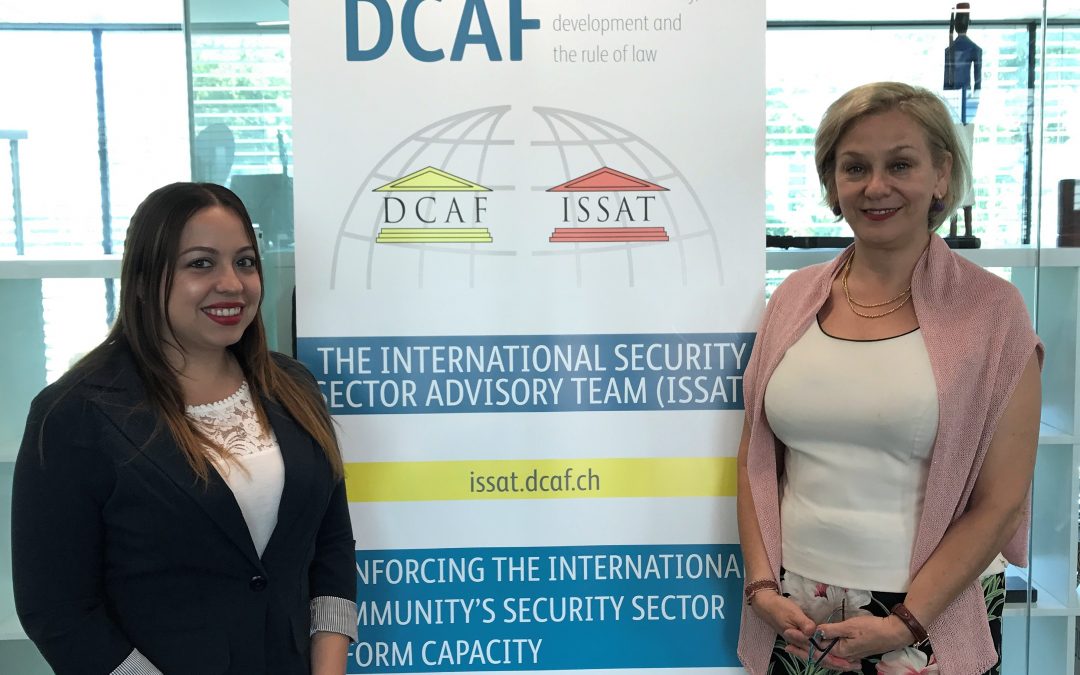
by Madison McHugh | Nov 1, 2017 | Graduate Students, Internship Experiences
My name is Marisela Rivera, and I am a Master of Arts candidate at Seton Hall`s School of Diplomacy and International Relations. Over the summer I had the pleasure of serving as the Sergio Vieira de Mello Fellow for the Geneva Centre for the Democratic Control of Armed Forces (DCAF) in Geneva, Switzerland, the international capital of the world. The fellowship honors a former United Nations Diplomat, Sergio Vieira de Mello, who was killed in the Canal Hotel bombing in Baghdad, Iraq in 2003. Mr. Vieira de Mello is remembered for his long and distinguished career with the UN as well as his efforts to promote peace, human rights and humanitarian aid.
Like Mr. Vieira de Mello, I am passionate about fulfilling peace and security for all. I specialized in two eminent concentrations to promote peace and security: International Law & Human Rights and International Security. My two specializations and my keen interest in Latin America have well prepared me for the fellowship. My host organization, DCAF, is an international foundation that is well-known for its support of security, development, and the rule of law.
Within the DCAF, I worked for the International Security Advisory Team (ISSAT). ISSAT was created to increase the capacity of the international community to support Security Sector Reform (SSR) processes, enhance the effectiveness and quality of SSR programming, and facilitate the coordination and coherence of international assistance for nationally-driven SSR processes. It focuses on four key services: advisory field support, training and capacity development, knowledge services, and advocacy and outreach.
Prior to my arrival, DCAF created a Latin America and Caribbean (LAC) department dedicated to Security Sector Reform. I worked with the director to set the foundation and sustainability flow for this particular department. Together, we created a strategy for LAC, as well as an overview of donors to the region. I utilized my social media and advertising skills to create a memorable LAC webpage, and I wrote country background notes, particularly in Latin American countries. In addition, I was tasked to develop a knowledge product for the Gender and Security section that applied a gender lens to explore the application of local ownership in SSR. The case study analyzed two countries and explore the lessons learned to increase the discussions on Women, Peace, and Security (WPS).
One of the most challenging and gratifying experiences was familiarizing myself with international security and human rights dialect in Spanish. Being of Colombian descent, Spanish is my first language. However, growing up in America and being part of the public education system, Spanish was not a priority. Through DCAF, I learned the importance of bilingualism and the various opportunities that it brings.
Overall, my time with DCAF was insightful and rewarding. I fulfilled many assignments in my area of study, and I was trusted with the duties of a Project Assistant as well as the work of an SSR Officer. My position at ISSAT offered first-hand experience in SSR, specifically in the international security aspect of my career. Given that this is the second year the Sergio Vieira de Mellow Fellowship was offered to a Seton Hall Graduate student, I would highly recommend my fellow peers to apply for this position in the future, and I know I will cherish the knowledge and experience gained with DCAF forever.
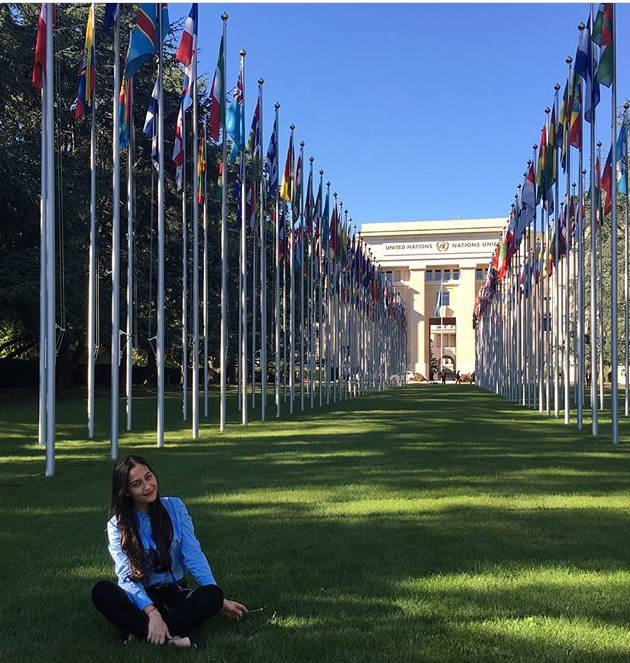
by Madison McHugh | Oct 4, 2017 | Graduate Students, Internship Experiences
My name is Isabel Deluna, and I am a Diplomacy student at Seton Hall. Switzerland was wonderful: being surrounded by multilateral organizations and diplomats from all over the world made my internship at the Dominican Republic Mission to the UN very interesting. Over the summer, a new Ambassador to the Dominican UN was chosen, and I spent much of my time preparing for his arrival by renewing and updating systems and archives.
At the mission, my primary responsibility was to prepare two types of reports for the Minister of Foreign Affairs at the Dominican Republic following UN meetings. We reported verbal notes for the United Nations to notify of activities or requests, as well as “oficio” reports, which were special reports sent to the Dominican Republic to inform the Ministry of Foreign Affairs of mission developments and changes in events or circumstances. I prepared each report with the information provided and entered them into the record system. Everything at the mission must be put on their record, and the reports were vital to fulfilment of the mission. In addition, I frequently assisted during United Nations sessions and meetings with Dominican Republic participants, helping active participants and observers alike.
I believe the internship helped me to build my professional network. I met a great many Ambassadors and diplomats from multiple missions in Geneva who shared their experiences with me and made recommendations on strategies for my future career. I believe it is important to know the missions’ systems as well as how they manage their representation at the United Nations.
I attended sessions that related to a variety of important topics, including migration, human rights, and indigenous groups. The sessions had a great impact on me, because I was able to see the way diplomats interact with each other and express concern and defend certain topics for the benefit of their respective countries. I feel I gained an understanding of their knowledge and strategies, and thus I learned how to think strategically and manage my expression of my opinions. I believe I can apply much of what I learned in future classes and discussions.
Throughout my internship, I gained skills that will help me ascertain my position on topics of importance as well as maintain and defend it, which amplifies my ability to analyse problems and situations on diverse topics. I am very grateful I was given the opportunity to improve my skills in a direct, diplomatic setting, and I would especially recommend the internship to those who are interested in the UN!
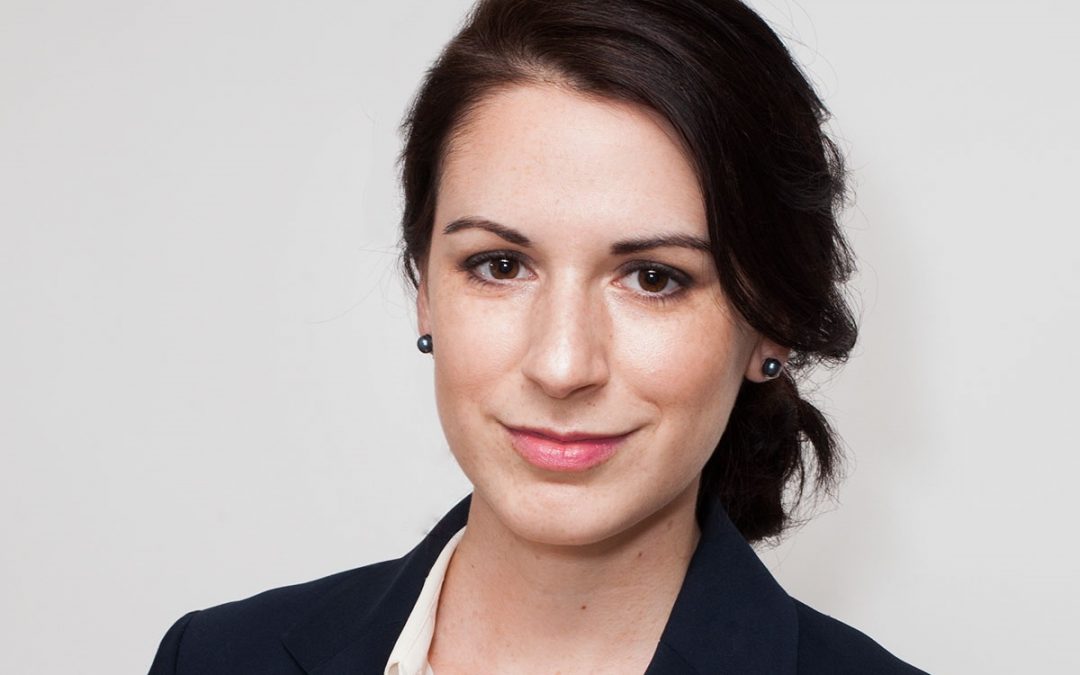
by Catherine Ruby | Jun 6, 2017 | Graduate Students, Internship Experiences
Emily Fox, M.A. May 2017
Carnegie Council on Ethics in International Affairs Internship
This spring, I had the opportunity to intern with the Carnegie Council on Ethics in International Affairs (EIA). I worked for Ethics & International Affairs, a journal publishing articles on current normative and ethical issues in foreign policy and international relations. One of my duties as an Editorial Intern was to act as the first point of assessment for all incoming submissions. In order to succeed at this task, I needed to have not only a strong theoretical background, but also a degree of familiarity with a wide array of current events. Thankfully, the School of Diplomacy has prepared me for these topics.
One of the most prominent debates in international relations ethics regards the policy and principle of the Responsibility to Protect, and many of the submissions I reviewed dealt with this topic. The knowledge I gained at the School’s United Nations Summer Intensive course was incredibly valuable for formulating assessments of these articles. Being able to hear firsthand from experts such as Hugh Dugan and Ed Luck really strengthened my background on the complexity of these issues and the opportunities and constraints the UN must navigate.
My skills in writing and editorial judgement were strengthened considerably by this internship, and I expanded my knowledge of international affairs by reading articles and essays by scholars. I learned a great deal about publishing and the peer-review process, and am able to participate and contribute in high-level meetings. Though I was lucky to have several years of professional experience prior to being hired at EIA, I have found that each professional environment teaches me something new about organization, communication, and workflow.
Should I choose to pursue a career as an editor, I will be prepared as my internship with EIA taught me a great deal about the requirements and challenges in the field, and has shown me the best practices for working through different stages of publication. As an intern, I often juggled several projects at once. My team at EIA was ready to provide guidance on prioritization and organization, which allowed me to complete my tasks efficiently without sacrificing quality.
The assignment I was most excited to complete at EIA was my book review. Each intern is invited to contribute a short review of a book of their choice for publication online and in the print journal. Because I could choose my book, I was able to pick something in an area in which I am interested. Not only was I able to read a book that interested me, but I also gained valuable writing experience from the exercise.
During my time at the internship, I tried to incorporate feedback whenever possible and volunteered for additional work when able. While I still have many opportunities for improvement, I think that applying these principles helped me to be successful thus far.
I would highly recommend my internship to others. The Carnegie Council is an excellent institution and a great place to be connected to. My coworkers have made me feel like a true member of the team, and their advice and guidance has been incredibly helpful for my professional development.
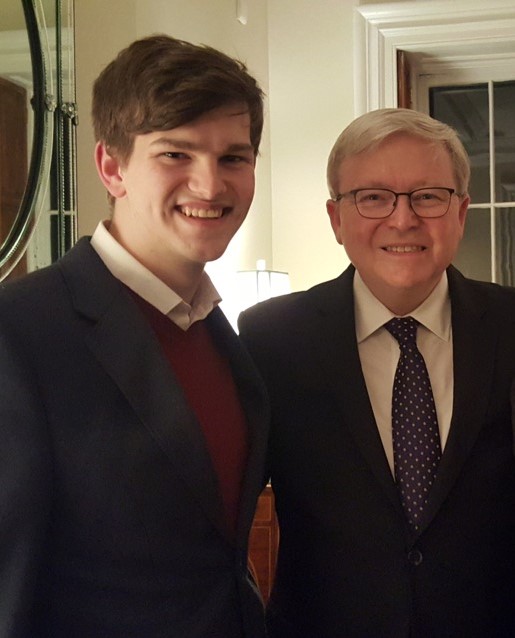
by Thomas Ashe | Feb 6, 2017 | Graduate Students, Internship Experiences
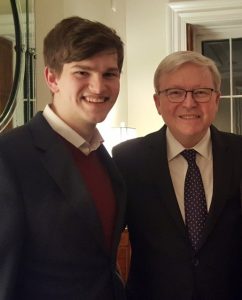
My name is Kevin Princic. I worked as an intern at the Asia Society Policy Institute in New York City. At Seton Hall University I am a second year graduate student pursuing a Master of Arts Degree in Diplomacy and International Relations with specializations in Foreign Policy Analysis as well as Global Negotiation and Conflict Management.
When applying to attend Seton Hall University’s School of Diplomacy and International Relations, I decided that one of the main goals of my graduate studies would be to branch out in my region of interest, Asia. I have studied Japan and China quite extensively; however, my knowledge of the rest of Asia was quite limited in comparison. With this goal in mind, I began my studies at Seton Hall but little did I know that my ambitions would lead me to an internship of a lifetime. At the School of Diplomacy and International Relations’ orientation, I first heard about the Asia Society from a colleague. She raved about her experience and encouraged me to apply for a position. This summer I took the plunge and applied to the Policy Institute and was so fortunate to receive an internship offer for the fall semester.
My work at the Asia Society Policy Institute has been instrumental in achieving my goal of becoming a well-rounded Asia scholar. One of the core responsibilities for interns with the Policy Institute is to conduct a press scan every day. Every Monday I began my day with a cup of coffee and several dozen news stories spanning all across Asia. It was duty to isolate the relevant stories, summarize them, and compile a list separated by sub-region. The final press scan usually contained around thirty different news articles. This task alone was instrumental in achieving my goal. Although I only completed the press scan on Mondays, I received it every day of the week from the other interns as well. This is just one of many instances in which the Asia Society is a full immersion learning experience.
I found that on more than one occasion that my work in the classroom at Seton Hall relates directly to my work at the Asia Society Policy Institute. For example, I was tasked with preparing a brief on North Korea’s nuclear programs and finding any related data. From my personal research I knew that this type of information was scarce due to North Korea’s isolationist nature. However, my relentless search proved fruitful for both myself and the Asia Society. The data I found helped me make progress on formulating my research design which will eventually become my Master’s Research Project and allowed me to provide a thorough brief to the Policy Institute. This is just one of many instances in which my work at the Asia Society and at Seton Hall intermingled.
The Asia Society Policy Institute is a think/do tank which makes it a little different from the typical think tank. My favorite aspect of the Policy Institute is its hands on approach to policy challenges in Asia. The Asia Society is also well known for its programming, bringing in prominent guests to speak on their research or practice. I was lucky enough to be working at the Asia Society as it held its United Nations General Assembly event series. During this series I assisted with events on topics ranging from North Korea’s nuclear program featuring both scholars and policy practitioners, to a dialogue on the Association of Southeast Asia Nations (ASEAN) 50th anniversary featuring delegates from several ASEAN states. The Asia Society even hosted the leader of Myanmar, Aung San Suu Kyi, who spoke on her efforts to democratize the country and reopen it to the world. Learning from these influential people through these events has been a truly unique and enlightening experience.
My experience at the Asia Society made me feel as though I am a part of something bigger that is having an impact in not only the United States, but also in Asia and even throughout the entire world.
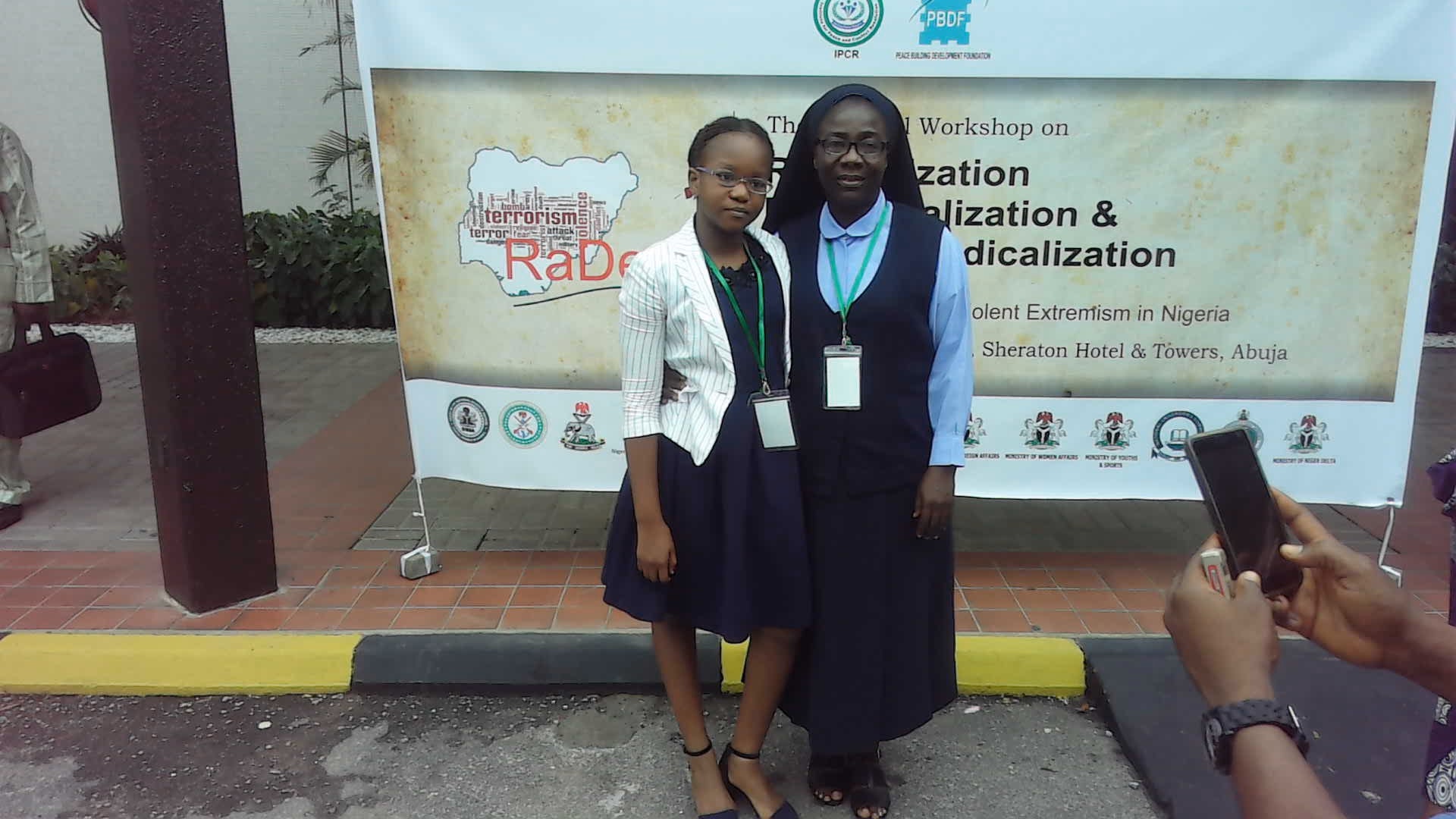
by Catherine Ruby | Nov 1, 2016 | Graduate Students, Internship Experiences
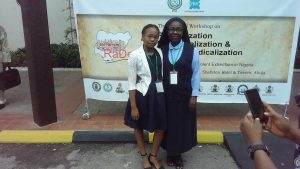
My name is Sister Mary John Bosco Ebere Amakwe and I am a graduate student at the School of Diplomacy and International Relations. I interned at The Institute for Peace and Conflict Resolution (IPCR) in Nigeria – at the Directorate of Internal Conflict Prevention and Resolution as a research assistant. This Institute was founded in 2000 under the Ministry of Foreign Affairs primarily as a research center, think-tank, and agency to strengthen Nigeria’s capacity for the promotion of peace and conflict prevention.
I chose to intern at this Institute because I was born and raised in Nigeria, a complex country where conflict is part of everyday life. I believe something has to be done because there is an urgent need for reconciliation and reconstruction of this great nation known as the “Giant of Africa.” and I want to be part of rebuilding efforts. Ultimately, I want to become a conflict mediator and my internship experience has absolutely solidified that passion to become one.
One of my very first assignments at the institute was to accompany a delegation which included the Director General of the Institute to the Embassy of Hungary that houses the United Nations High Commission for Refugee Agency (UNHCR) in Nigeria. The reason for the visit was to sign a Memorandum of Understanding (MoU) between the Institute and UNHCR. This signing is very important according to the UN Higher Commissioner for Nigeria and the Director General of IPCR because it is a way to formalize the partnership between the two bodies in their effort to further peace building efforts in Nigeria. UNHCR and IPCR also work together with different stakeholders in the country in revamping peace and taking preventive measures to stop conflict so that there will not be refugees and internally displaced people in the country. This is done by creating policy frameworks like personnel building, networking, and the implementation of all initiatives that will bring about conflict prevention and will lead to lasting peace in Nigeria. On July 11, 2016 there was another signing of a Memorandum of Understanding (MoU) between IPCR and Treasure Hunts – an NGO for peace and development in Nigeria which uses artwork, drama, plays, etc. for peace building. This experience fascinated me because it validated what I learned in the classroom and connected my course work as strategies for peacebuilding.
Finally, my internship offered me opportunities for networking. For instance, I had several conversations with Mrs. Paulette Dadey, the UN High Commissioner for Refugees in Nigeria; Mrs. Elizbeth Ekaete, the CEO of Emmanuel Royal Foundation for peacebuilding in families; Dr. Aliyu Ahmed-Hameed, principal consultant for Cardston Consulting Agency on peace research, policy and strategy; Dr. Marane Ngoulla, CEO of TOGUNA (the place of dialogue for peace) Foundation for peace and development. My last visit was with the Coordinator for the African First Ladies Peace Mission; and a member of the Nigerian House of Representatives. We discussed her role as a woman legislator representing her constituency in the House.
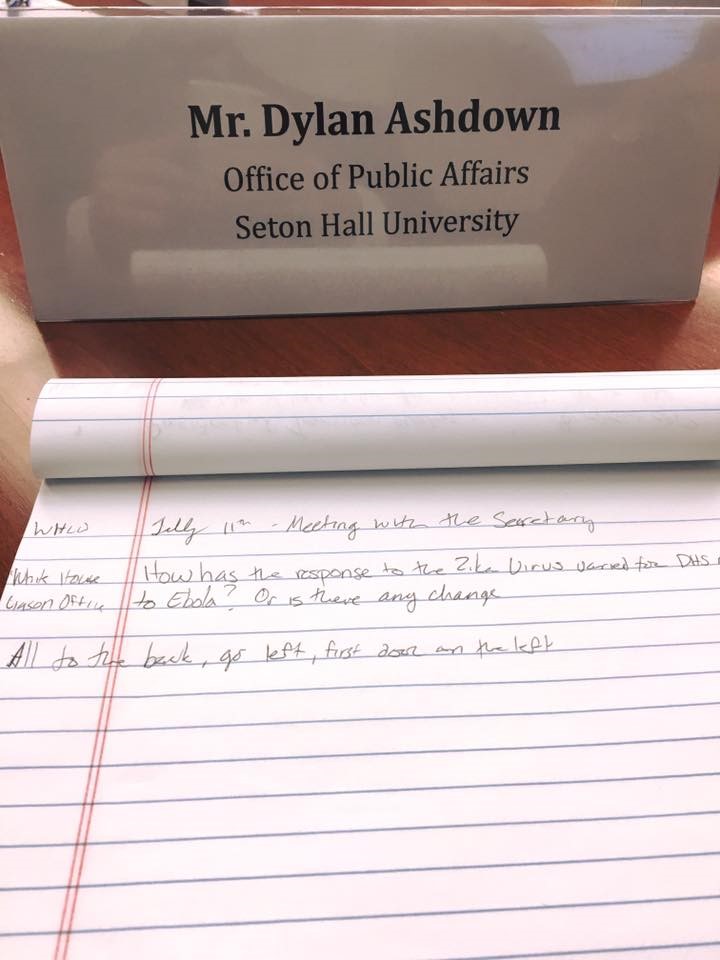
by Catherine Ruby | Aug 18, 2016 | Graduate Students, Internship Experiences
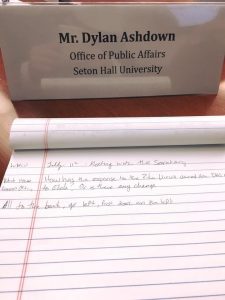
Finding a Home at Homeland Security
Hello, my name is Dylan Ashdown and I am currently a Public Affairs intern in the Office of Multimedia, Motion Pictures, and Television, Office of Public Affairs, Department of Homeland Security (DHS). At Seton Hall, I am finishing up two Master’s degrees which will be awarded to me at the end of my internship; one degree will be in Diplomacy and International Relations and the other is in Strategic Communication. This internship has been very beneficial and I highly recommend it to anyone who is interested!
I have the “cool” internship. I work directly with the writers and producers of documentaries, television shows, and feature films, along with other “non-news” media stakeholders. Both of my degrees have been of use in this internship. The other day a writer reached out to our office requesting DHS’s help with their show. I ended up spending a few hours researching where I would defect if I was a scientist escaping from an evil government in New York City for a script the writer was working on. This was something that was very relevant to my Diplomacy schooling. In terms of my Strategic Communication classes, I have put together pitch plans for movie producers and interviewed cybersecurity professionals, and technology experts/inventors (all of whom one can find in the Homeland Security).
There is always something exciting happening at DHS. For example, today I attended the daily morning briefing and found out that I was meeting the Secretary of Homeland Security in three hours. Three hour later, I am sitting in a room with 15 other interns getting a briefing directly from the Secretary. This is not your normal internship experience!
Ultimately, the best thing about my internship hasn’t been meeting politically famous people; the best part has been the mentorship that I have received from my supervisor. I never really understood the meaning of a mentor until I started this internship. I asked more questions in my month here at DHS than I ever did in my six years of school and my mentor has gone out of his way to answer all of them. I have learned how to walk, talk, and behave as a public affairs professional in Washington D.C. because of the hours that I have spent with my mentor and because of how much he trusts me to handle projects on my own.
The most rewarding part of my internship is knowing that my work has a direct impact on educating the American people on the work of the Department of Homeland Security. I am very happy that I chose to intern at the Department of Homeland Security, Office of Public Affairs.
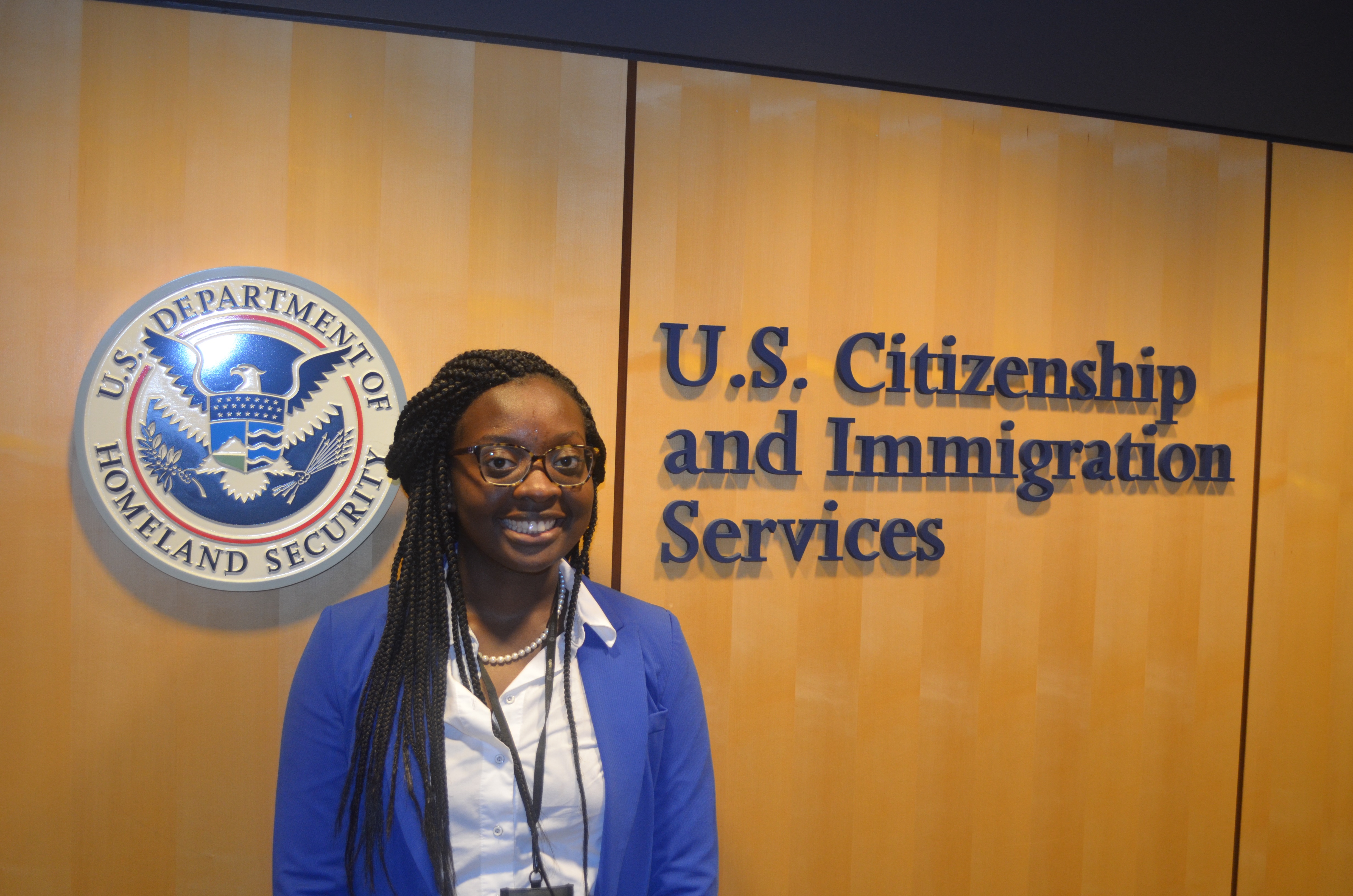
by Catherine Ruby | Aug 18, 2016 | Graduate Students, Internship Experiences
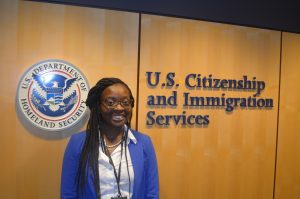
I am Nina Robinson, a dual degree candidate of the M.A. programs in Diplomacy and Asian Studies. I interned with the Department of Homeland Security: United States Citizenship and Immigration Services (USCIS), specifically with the Office of Privacy. My long-term goal is to become a Foreign Service Officer and to one day serve as a Career Ambassador. Since high school, after studying in China for two consecutive summers, I knew that I wanted to dedicate my life to a career in Diplomacy.
Essentially, my desire to hone my skills and apply the knowledge that I learned in my Diplomacy classes; gain Federal Government experience; and to prepare for a career serving the United States, is what led me to pursue an internship with DHS-USCIS. The Department of Homeland Security was created after the September 11, 2001 terrorist attacks, to safeguard the United States’ border. The agency’s mission is to protect all people, including U.S. citizens, permanent legal residents, immigrants, and non-U.S. citizens. The Department of Homeland Security has offices almost all over the world, which assists those who wish to become citizens and seek asylum due to fear of persecution or danger.
Working with the Department of Homeland Security- United States Citizenship and Immigration Services, introduced me to the many avenues that one may take to establish a federal career focused on international relations. The Office of Privacy, although a small office and often confused with civil liberties or security, plays an important role in the agency. USCIS works to ensure that citizens around the world have the opportunity to become U.S. citizens and provides benefits and services for immigrants. The Office of Privacy works to ensure that the work conducted in USCIS promotes transparency in the government and protects its clients who include non-U.S. citizens and immigrants. The Privacy Act of 1974, which was enacted after the Watergate scandal with then-President Richard Nixon, is the cornerstone of my office. This Act is what helps the Office of Privacy guarantee that information being collected from the people by the government is being protected. Our office ensures that immigrants’ and citizens’ personal information, provided to the Department of Homeland Security and the United States Citizenship and Immigration Services, is being protected, which includes informing clients of what their information is being used for and how it will be used.
In the short period of time I interned here, I have learned a tremendous amount. I have attended four trainings, all which are exclusive to the analysts and officers in the Office of Privacy. As not to go too far into specifics, I have learned about the importance of encrypting PII (Personal Identifiable Information) and various information sharing database sources that the United States and other partner countries use to identify suspected terrorists. Along with training, my office has also provided mentorship, helping me to familiarize myself with various Privacy Act Laws as it relates to the Federal Government and offering career related advice. My life-long dream of becoming an ambassador has not changed. However, Privacy has become a big issue in the world of International Affairs and is a growing field. Students who are looking to put their diplomacy and analytical skills to use may find Privacy an interesting and exciting alternative to the Diplomacy field.
by Carolin Braxenthaler | May 5, 2016 | Graduate Students, Internship Experiences
My name is John “Jack” Rotticci and I am in my second semester studying a Master of Arts in Diplomacy and International Relations. I majored in international business during my undergraduate studies and was excited to continue learning about international trade as part of my specializations at Seton Hall’s School of Diplomacy, which are International Economics and Development, and Global Negotiation and Conflict Management. This semester, I am taking an internship course that provides both a look at the combination of knowledge and skills required to perform in the field of international trade, and more specifically, an up-close opportunity to explore the daily operations of a career in commercial advocacy.
My placement is with the U.S. Commercial Service Export Assistance Center, Northern New Jersey, commonly referred to as a USEAC, where a small staff of International Trade Specialists is responsible for assisting in and promoting exports by northern New Jersey manufacturers and service providers. Each International Trade Specialist is responsible for working with a certain group of industries. My role as an intern, or as we have taken to calling it in the office, an “international trade assistant,” is to support the trade specialists in their pursuit of this goal. This is a neat feature of the internship because it allows me to get an introduction and a feel for each industry. This is valuable knowledge as I have already found some industries that I am particularly interested in – and some that I am particularly uninterested in.
Another great feature of my internship at the NNJ USEAC is the group of professionals I work with. The small team environment means that, unlike many internships, I do not spend the day in the basement stapling reports or running for coffee. It can be a challenge because the team truly relies on every member, including me, the intern; however, the office environment makes me feel comfortable asking questions if I am unsure. Furthermore, I am given more responsibilties after I prove that I can handle them.
You will be asked to take on several projects and initiatives at this internship, each with different levels of priority and timelines. It is up to the intern to prioritize time to accomplish what is asked. I have thoroughly appreciated this autonomy as it has provided opportunities to prove my ability to both the team and to myself, to make mistakes and learn from them, to learn in the process of researching and completing a project.
One such type of project is event planning. As an intern at the NNJ USEAC, I helped to organize several informative trade promotion events. I was recently able to help on an Introduction to Exporting to Canada event. While this event was not directly a USEAC event, I worked with partner offices to ensure that the attendees had access to information about all of the assistance services available to them in their efforts to export.
I am also helping to organize an event held in cooperation with the Bureau of Industry and Security (BIS) that focuses on compliance with US export controls. As part of the planning process, I researched export controls and got a better grip on what the federal government is doing to ensure that rogue states cannot profit from illegal or sanctioned international trade.
I find this internship to be much more rewarding than others I have previously completed. This is largely due to the fact that I am treated as a team member as opposed to a temporary intern. The team is committed to ensuring that I am not only given the opportunity to contribute all that my ability will allow, but also, that the internship is actually serving as a learning experience and helping me to better understand the Commercial Service as a potential career path. I would enthusiastically encourage any student interested in international trade and commercial diplomacy to apply.











